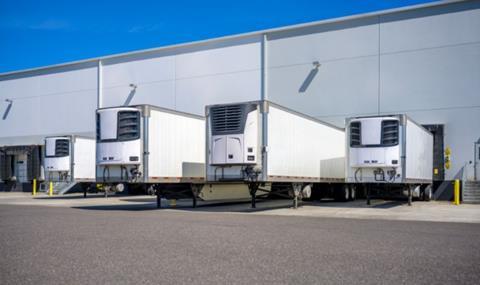
The government has let down temperature-controlled hauliers by failing to deliver on its promise to help the industry transition to emission-free refrigerated trailers, the Cold Chain Federation (CCF) said this week.
The accusation comes as the CCF publishes its report: The Journey Towards Emission Free Temperature-controlled Distribution on Road Vehicles this week.
The CCF said that government promises for support to help the industry transition to net zero have yet to materialise. It warns that with 30,000 refrigerated trailers and 40,000 temperature controlled vans and rigid vehicles on the road, the industry faces a complex challenge to cut its carbon emissions and achieve net zero whilst continuing to distribute fresh and frozen food and pharmaceuticals across the entire UK cold chain, particularly in the face of the Covid-19 pandemic and the current driver shortage crisis.
The Federation is asking government to commit to a series of support measures to help fresh and frozen food and pharmaceutical hauliers meet their new industry-led plan for emission-free vehicle refrigeration by 2039.
The report sets out ambitious plans to meet the 2039 target, including no transport refrigeration units (TRUs) to be sold into the UK market containing refrigerants with a global warming potential (GWP) of more than 300 by 2025; and no new diesel TRUs to be sold into the UK market after 2029.
To help industry meet these targets the report calls on the government to provide clear strategies on the deployment of the necessary technologies, support for the installation of electric charging for vehicles and temperature-controlled trailers at depots and rest points, regulation to help industry maintain or remove older trailers from the road, financial support for trials or for the adoption of lower emission technologies and greater communication with the sector when developing the freight system of the future, as outlined in the Transport Decarbonisation Plan.
Shane Brennan, chief executive of the Cold Chain Federation, said: “The cold chain is pulling out all the stops to keep food on our shelves in the midst of the industry’s worst crisis in living memory.
“Despite the exhausting cumulative burden of the driver shortage crisis, disruption from Covid and major challenges related to post-Brexit changes, these businesses are committed to progress towards a net zero future by finding ways as an industry to phase out the use of diesel in vehicle refrigeration entirely. Government must start to play its part too.
“Transporting food at reliable low temperatures is so important to tackling the climate impact of food waste as well as to a safe and resilient national food supply, but a net zero food chain can’t be achieved without overcoming the complex challenge of transitioning to emission free refrigeration on distribution vehicles.
“But the technology is not ready, the infrastructure is not in place and we feel let down by government’s previous promises of direct support for trialling and adopting emission-free technology which never materialised.
“Our ambition is achievable but only with meaningful government action to help us address the infrastructural and economic barriers.”
The Cold Chain Federation said it has presented its demands to DEFRA, BEIS and the DfT and is awaiting a response.













